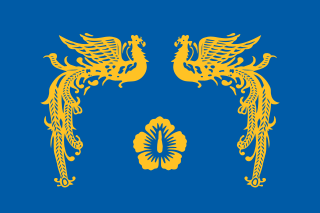Top Qs
Timeline
Chat
Perspective
State Council of South Korea
Executive authority in South Korea From Wikipedia, the free encyclopedia
Remove ads
The State Council of the Republic of Korea (Korean: 국무회의; Hanja: 國務會議; RR: Gungmuhoeui) is the chief executive body and national cabinet of South Korea involved in discussing "important policies that fall within the power of the Executive" as specified by the Constitution. The most influential part of the executive branch of the government of South Korea are the ministries.[1]
Remove ads

Remove ads
Members
Summarize
Perspective
As of August 2020, the Executive Branch of the government operates 23 ministries, 18 administrative authorities, 2 boards, 4 offices, and 7 committees.[2] The State Council includes 18 ministers, the prime minister and the president. Ministers must be appointed into the State Council before confirmation by the National Assembly. The president is the chairperson of the State Council, and the prime minister is the vice-chairperson.[3]
Although not the official members of the State Council the following individuals, and other officials designated by law or deemed necessary by the Chairperson of the State Council, can also attend State Council meetings and speak in front of the State Council without the right to vote on the matters discussed in the meetings of the SC-ROK.[4] The individuals are:
- Presidential Chief of Staff
(대통령비서실장) - Director of the National Security Office
(국가안보실장) - Chief Presidential Secretary for Policy
(대통령정책실장) - Minister of Government Policy Coordination
(국무조정실장) - Minister of Personnel Management
(인사혁신처장) - Minister of Government Legislation
(법제처장) - Minister of Food and Drug Safety
(식품의약품안전처장) - Chairperson of the Korea Fair Trade Commission
(공정거래위원회위원장) - Chairperson of the Financial Services Commission
(금융위원회위원장) - Mayor of Seoul
(서울특별시장)
The Mayor of Seoul, although being the head of a local autonomous region in South Korea and not directly related to the central executive branch, has been allowed to attend State Council meetings considering the special status of Seoul as a Special City and its mayor as the only cabinet-level mayor in Korea.
Current members
Remove ads
Role
Summarize
Perspective
The State Council is the highest body for policy deliberation and resolution in the executive branch of the Republic of Korea. Article 89 of the South Korean constitution specifies what "important policies that fall within the power of the Executive" the State Council has to deliver:[5]
- Basic plans for state affairs, and general policies of the Executive;
- Declaration of war, conclusion of peace and other important matters pertaining to foreign policy;
- Draft amendments to the Constitution, proposals for national referenda, proposed treaties, legislative bills, and proposed presidential decrees;
- Budgets, settlement of accounts, basic plans for disposal of state properties, contracts incurring financial burden on the State, and other important financial matters;
- Emergency orders and emergency financial and economic actions or orders by the President, and declaration and termination of martial law;
- Important military affairs;
- Requests for convening an extraordinary session of the National Assembly;
- Awarding of honors;
- Granting of amnesty, commutation and restoration of rights;
- Demarcation of jurisdiction among the Ministries of the Executive;
- Basic plans concerning delegation or allocation of powers within the Executive;
- Evaluation and analysis of the administration of state affairs;
- Formulation and coordination of important policies of each Executive Ministry;
- Action for the dissolution of a political party;
- Examination of petitions pertaining to executive policies submitted or referred to the Executive;
- Appointment of the Prosecutor General, the Chairman of the Joint Chiefs of Staff, the Chief of Staff of each armed service, the presidents of national universities, ambassadors, and such other public officials and managers of important state-run enterprises as designated by Act; and
- Other matters presented by the President, the Prime Minister or a member of the State Council.
The State Council of the Republic of Korea performs somewhat different roles than those of many other nations with similar forms. As the Korean political system is basically a presidential system yet with certain aspects of the parliamentary system combined, the State Council of the Republic of Korea also is a combination of both systems. More specifically, the Korean State Council performs policy resolutions as well as policy consultations to the President. Reflecting that the Republic of Korea is basically a presidential republic the State Council resolutions cannot bind the president's decision, and in this regard the Korean State Council is similar to those advisory councils in strict presidential republics. At the same time, however, the Constitution of the Republic of Korea specifies in details 17 categories including budgetary and military matters, which necessitates the resolution of the State Council in addition to the President's approval, and in this regard the Korean State Council is similar to those State Councils in strict parliamentary systems.[5]
Remove ads
Meetings
Although the president is the chairman of the council, the Prime Minister nevertheless frequently holds the meetings without the presence of the President as the meeting can be lawfully held as long as the majority of the State Council members are present at the meeting. Also, as many government agencies have recently been moved out of Seoul into other parts of the country, the need to hold State Council meetings without having to convene in one place at the same time has been growing, and therefore the law has been amended to allow State Council meetings in a visual teleconference format.[6]
List of cabinets of South Korea
See also
References
Wikiwand - on
Seamless Wikipedia browsing. On steroids.
Remove ads









